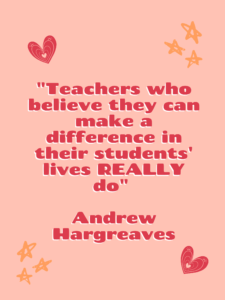My Path With Heart – Making a Difference in Someone’s Life

Personal Philosophy of Education
Throughout these last few years, I have been exposed to, and have learned numerous concepts, ideas, and perspectives that have, and will continue to shape my personal lifelong journey as an educator. Very early on in the B.Ed program, candidates were asked to reflect on their teaching philosophies. I knew immediately that I favored the progressivism philosophy; the philosophy where education comes from the experiences of the learner focussing on the whole child and their relationships with the many partners that make learning possible. Dewey (1938) elaborates on such relationships stating “they relate to and bring out the students’ interests and experiences that have meaning to them” (p. 5). He argues that essential to the process is the opportunity for reflection and “meaning making” that connects the student’s experiences to the student’s world (p.38). In a progressivist school, students are actively learning by interacting with one another and developing social skills such as cooperation, collaboration, and open-mindedness in accepting different points of view. As I reflect on the progressivist philosophy and what I have learned thus far, I know wholeheartedly that education is a process of ongoing growth. What I am realizing is that ongoing growth requires a foundational component of building relationships with a multitude of partners that will enrich and make possible the journey of being a lifelong learner. I want to contribute to an educational landscape where students of all ‘walks of life’ have positive and empowering experiences in formal education enabling them to value their identities, cultures, histories, and communities. This will be a lifelong journey that I look forward to.
As a future teacher, and in keeping with the whole child and the progressivism philosophy, I am quickly realizing that we have the great challenge and responsibility of engaging students in learning so that they develop the skills and knowledge they need to function in today’s world. The question becomes – how do we instill the skills and the values necessary to experience success in the present and in the future? How can we provide opportunities for students to move beyond being passive recipients of knowledge to become knowledge builders, capable of creative and innovative solutions to problems? I package this up to having the ability to trigger and activate one’s curiosity, both individually and within the larger classroom. Within the many strategies that encompass inquiry-based learning, I see that working towards a common goal is perhaps the best overall strategy to use. No matter what the topic or direction of inquiry, it is important to bring the class together to “check in” and share and discuss the big ideas of the subject/investigation/inquiry at hand. By doing so, everyone benefits. On an individual level, students benefit by hearing perspectives different from their own, potentially revealing important insight into a particular problem or learning obstacle they may have. It is through the social practice of learning and thinking that students learn to think for themselves. When the entire class is working toward a common goal of understanding – and different perspectives and approaches to problems are not only welcomed but also encouraged – all class members benefit by contributing to a knowledge base that is greater than the sum of individual contributions alone.
This, in my opinion, is success!
Dewey, J. (1938). Experience and Education. Indianapolis: Gappa Delta Pi